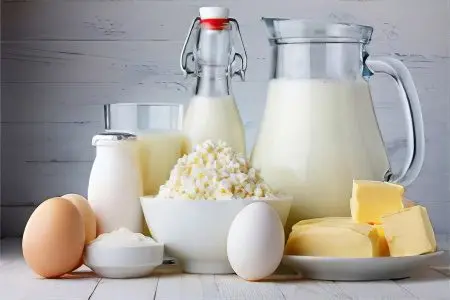Contents
- The very first month of feeding a newborn – what is better to eat?
- What fruits can a nursing mother eat?
- Is it possible to eat cucumbers, cabbage, tomatoes while breastfeeding?
- Is it possible for a nursing mother to have beer, juice, tea, coffee, kvass, compote?
- Can I have milk, ice cream, eggs?
- Can I have seeds and nuts?

Breastfeeding is a time when a woman begins to carefully consider her own diet. In this regard, a lot of questions arise regarding what is possible and what products are prohibited. Most women come to the conclusion that it is best to stick to a strict diet. However, there is no such product that a mother can eat and every baby in the world will have a negative reaction to it.
It’s just that there are certain foods that, given the individual predisposition of the mother and child, can cause negative consequences. Therefore, in order to avoid the occurrence of allergic reactions, a woman tries to limit her diet as much as possible.
Known to every young mother, the prohibitions on eating, for example, cabbage or cucumbers, do not work at the moment. Breastfeeding experts unequivocally say – you need to eat what the body requires. He will independently tell you what products you need to refrain from. Thus, it will be possible to provide good nutrition to the child and at the same time not harm him in the form of an allergic reaction.
If you really want something, then you can try, the main thing is to know a sense of proportion and do not forget to monitor the behavior of the crumbs. If any rashes appear on the skin or there are violations of the gastrointestinal tract of the child, it is necessary to think about which product from the so-called risk group could cause such a reaction. Having identified the culprit, you need to temporarily stop using it. Why for a while? Simply because it is highly likely that after a very short time the child’s response to the same component will be radically different. Often, those foods that cause allergies in the first three months of life are perfectly absorbed by the baby by the age of six months.
The very first month of feeding a newborn – what is better to eat?
From bakery products (not rich): bran, wheat, rye-wheat bread, biscuit cookies are allowed;
From meat products: boneless chicken, beef, boiled veal;
Kefir and fermented baked milk, cottage cheese and uncolored yogurt;
From cereals: any cereals without milk, or diluted in a ratio of one to one “water / milk”;
From vegetables: potatoes, zucchini, cauliflower (white cabbage and carrots are allowed in small quantities), cooking method – stewing and boiling;
From drinks: herbal teas (cumin, dill, anise), black, but not strong tea, compote (dried fruits and apples);
From soups: vegetarian soups without the addition of frying, as well as those cooked in a weak meat broth.
Under the ban for a nursing mother in the first months of a child’s life are:
All inhabitants of the sea and red fish;
From drinks: strong tea and coffee, compotes and juices of industrial production, alcohol, sparkling water;
From dairy products: whole milk and yogurts containing any artificial additives and dyes;
Canned food, fatty and fried foods, sausage;
From soups: a strong broth based on fatty meat is prohibited.
What fruits can a nursing mother eat?

As for fruits on the menu of a nursing woman, there are so many doctors, so many points of view. Some doctors categorically prohibit their use, especially in the first 3 months. Others argue that they can be eaten, but in small quantities.
The fact remains indisputable – it is necessary to be careful with exotic fruits. Among the most dangerous are kiwi, pomelo, avocado, rambutan, mango, carambola, and all citrus fruits. The digestive system of any person, including a nursing mother and her child, will better and easier perceive those fruits that grow in their places of birth. Overseas fruits can provoke allergies and are definitely additional risk factors.
So, for newborns who were born in Spain, or, for example, in Florida, an orange is considered the optimal fruit from which the first complementary foods begin. While for Russian children this is unacceptable.
Can you eat apples?
The opinion that apples can provoke bloating and diarrhea is justified, but only when a person has such an individual feature. In all other cases, this fruit can be eaten, and when the child is 10 months old, even an apple should be introduced into his diet. Naturally, if the mother is allergic to red-skinned fruits, then they should be banned. However, such cases are the exception rather than the rule. When a woman was pregnant, ate apples and did not suffer from allergic reactions, then you should not be afraid of her after delivery. Therefore, almost all mothers can eat apples during feeding. If you still have doubts, then you can simply get rid of the peel. Some doctors give such a recommendation: include these fruits in the menu only in baked form in the first month of lactation.
Can a breastfeeding mother eat bananas?
They are forbidden in the maternity hospital, but this is an elementary precaution. These fruits can and should be eaten. It is bananas that contain mescaline – a substance responsible for a good mood, for raising strength and vitality. In addition, these yellow fruits are rich in minerals and vitamins. To get the most out of a banana, you can make a smoothie with yogurt based on it. Simply grind the fruit with a blender, and then mix everything with a mixer.
Is it possible to breastfeed strawberries, cherries, cherries?
Strawberry. The fact that this berry is taboo for nursing mothers is an unfounded myth. If she was grown in her own garden plot or bought from an old woman in the market, then why not eat up to 7 berries. After that, you should look at the reaction of the child, if nothing happens, then you can safely continue the tasting. Of course, you should not eat half a bucket of strawberries. In this case, rashes will appear not only in the baby, but also in most adults. If you follow the measure and consume only seasonal berries, then there will be no harm for sure. After all, it is strawberries that are a storehouse of vitamin C. There is even more of it in it than in an orange.
Cherries and cherries. Most women deny themselves the pleasure of enjoying these stone fruits just because of their bright color. But red pigment is not a synonym for the word “allergen”. A reaction to it is possible only in case of individual intolerance, or as a result of the abundant use of berries. For insurance, you can eat a few cherries and track the reaction of the child. If it did not follow, then you should not miss the moment and completely abandon red berries.
Melons and watermelons. If doctors often argue about other products, then with respect to these melons they are surprisingly in solidarity. At the time of breastfeeding, it is better to refuse them. The thing is that they are grown on soils that are depleted and weak, so they cannot do without chemicals that are harmful to the body of even the most healthy person. In addition, it is watermelons that tend to accumulate them, and it is impossible to remove chemistry from a striped berry. Therefore, it is better to refuse early watermelons. If you really want to, you can eat a few pieces in September and late August. Melon, on the other hand, belongs to heavy foods, you can eat it during lactation quite a bit and without combining it with other foods.
Is it possible to eat cucumbers, cabbage, tomatoes while breastfeeding?

Most women are of this opinion: cucumbers, white cabbage and zucchini should be abandoned, as they are provocateurs of flatulence, which means they contribute to increased colic in the baby. The explanation is simple: they weaken, as they have a lot of fiber. Is it really?
Cucumbers. It is they who are unreasonably priority vegetables that top the list of foods prohibited during lactation. “Knowing” mothers say that one has only to eat a cucumber, and a green stool with foam is provided for the baby. However, for some reason they forget that such a relaxation can happen due to the fact that the child simply does not receive enough fatty hind milk and early anterior milk prevails in his diet. In addition, there are a number of studies indicating that the violation of the baby’s digestion is most often associated with intolerance to the protein that is part of the formula and breast milk. Therefore, a nursing mother can eat those vegetables that she used to consume before pregnancy. Especially after the first 3 months.
Cabbage. Why is it necessary to abandon such a healthy and tasty vegetable during breastfeeding? If cabbage causes increased gas formation in mother and child, it is enough to add cumin to it and the negative effect will disappear by itself. Moreover, sauerkraut is so necessary in winter, because it is the champion in vitamin C content. In addition, white cabbage contains folic acid and a host of other useful trace elements. Therefore, scientifically unfounded prejudices should be discarded and this healthy vegetable should be included in the daily diet.
Tomatoes. Young mothers refuse them because of the same rich red color, fearing to provoke an allergy in the crumbs. While lycopene, which gives color to tomatoes, is a powerful antioxidant. Both the woman herself and her baby need it. Just one glass of tomato juice can fill up to half of the daily requirement of vitamin C. But you should not drink it on an empty stomach. However, women who are breastfeeding should not consume tomatoes with nitrates. In order not to buy a dangerous vegetable, it is important to know some rules.
Is it possible for a nursing mother to have beer, juice, tea, coffee, kvass, compote?
Drinks are a separate topic that interests many mothers who breastfeed:
Cocoa and chocolate. It is better to refuse their reception actually. And there are really good reasons for this. The proteins that make up cocoa beans can provoke a serious allergy in an infant. In addition, each of these drinks is high in sugar, and sweets during breastfeeding are best, if not completely eliminated, then limited.
Kvass. The ban on this drink is due to the fact that it contains yeast, as it is the result of natural fermentation. It is they who can provoke bloating in the intestines of the mother and child. If you buy industrial kvass, then it will definitely contain concentrates and additives, and it is also often carbonated. You can take a few sips if there is an irresistible desire, and if the composition of the drink contains nothing but sugar, yeast and malt.
Beer. It is a mistake to take this drink as harmless, natural and not harmful. You should not believe the commercials – natural brewing has not been in Russia for a long time. All beer is the result of a combination of harmful components and preservatives. In addition, alcohol is harmful to the baby, and he will definitely get it if the nursing mother drinks beer. Some women consider drinking alcohol-free beer. But this drink, in order to transform, went through many production stages, which means that it is far from useful for both the mother and the child.
Juices. You should not think that the juices that are on store shelves are beneficial for the health of a woman or even a child. All of them are oversaturated with preservatives, made from concentrates with a shock dose of sugar. Therefore, in addition to taste pleasure, such drinks can no longer bring any benefit. If you want to pamper yourself with juice during lactation, then you should cook it yourself and use it in small dosages. Pomegranate, carrot and apple juice is allowed.
Compotes. This drink is definitely allowed for use by a nursing woman. You need to cook it on the basis of dried fruits, if it was decided to add berries, then it is worth observing the reaction of the child.
Strongly brewed coffee and tea. These drinks can harm the child because of the caffeine they contain. It can cause increased irritability, anxiety and sleep disturbances in the baby. This, in turn, negatively affects the nervous system of the crumbs. Moreover, scientists have repeatedly confirmed this fact in ongoing studies.
Can I have milk, ice cream, eggs?

Milk. There is no unequivocal opinion as to whether a nursing mother can consume milk. Some doctors claim that it can be added in small amounts to tea or porridge. Other doctors are of the opinion that if the baby is not allergic to the protein that is part of the milk, then the mother can drink it. To decide whether it is possible to include milk and products based on it in the diet, a woman needs to drink milk, and after feeding, watch the baby. If rashes suddenly appear, then at least a week should give up milk. The rash is coming down – so there is a need for an analysis. In the event that it is positive, then you will have to abstain from milk.
Ice cream. An allergic reaction to cow protein automatically imposes a ban on eating ice cream. In addition, most manufacturers add palm oil to this delicacy, which has a negative effect on the human body.
Is it possible eggs. You should not refuse this product, but only if the baby does not have an allergic reaction to chicken protein. You can also find out by donating blood for analysis. If everything is in order, then it is allowed to eat one fresh egg per day. To determine its quality, it is enough to dip the egg into a glass filled with water. The egg has sunk – so you can eat it. A nursing woman should not include untested eggs in her diet. They need to be washed before cooking.
Can I have seeds and nuts?
It is known for certain that both nuts and seeds are the most powerful allergens. Therefore, in order to protect yourself and your child, you should not eat more than 3 nuts per day. You can often hear recommendations for increasing a woman’s consumption of walnuts in order to improve lactation. Indeed, they are able to stimulate the production of milk, as well as become a source of vitamins and vegetable fats. However, in everything it is necessary to observe the measure, this is especially true if the child is still very small.
Seeds often cause allergies in those children whose mothers respond to the pollen of various grasses. If such reactions were not noticed, then you can gnaw a little on the seeds.
So, the lactation period is far from a reason to deny yourself absolutely everything. Naturally, it is necessary to limit such harmful products as: coffee, alcohol, sausages, etc. But they are harmful not only during feeding, but also in everyday life. As for the rest of the food, they can and should be introduced, but this should be done carefully and no more than one new component per day.









